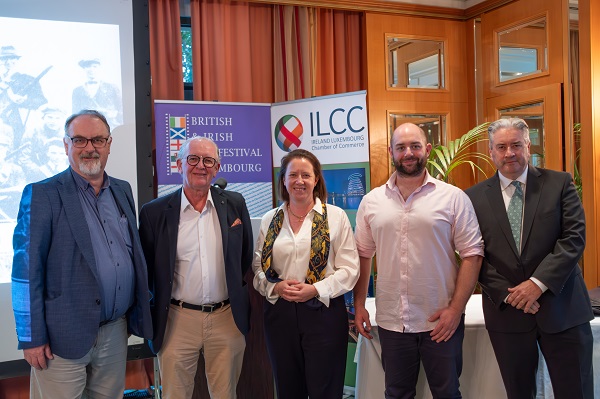 (L-R) Geoff Thompson, BIFFL organiser; Joe Huggard, ILCC Chairman; Irish Ambassador to Luxembourg, Jean McDonald; Dr James Gallacher, University of Luxembourg lecturer; Ken O'Mahony;
Credit: Ali Sahib
(L-R) Geoff Thompson, BIFFL organiser; Joe Huggard, ILCC Chairman; Irish Ambassador to Luxembourg, Jean McDonald; Dr James Gallacher, University of Luxembourg lecturer; Ken O'Mahony;
Credit: Ali Sahib
On the evening of Tuesday 26 September 2023, a seminar held as part of the British & Irish Film Festival Luxembourg (BIFFL) 2023 Autumn Edition, took place at the Hotel Parc Belair in Luxembourg-Merl.
Festival organiser Geoff Thompson briefly introduced the evening’s speakers and welcomed the new Irish ambassador to Luxembourg, Jean McDonald, and the audience to one of the autumn’s final events for the festival’s fourteenth edition.
Dr James Gallacher, lecturer from the University of Luxembourg, gave an overview of depictions of conflict and trauma in British and Irish cinema showcasing the “intricate relationship between British and Irish history and culture” through a number of historical films. He pointed out that many early examples of Irish cinema had themes of conflict as a general topic and sought to define national identity through the “Revival”. He cited films such as Rory O’More (1911), Guest of the Nation (1934) and The Dawn (1936) as examples of nationalist narratives and explained the double bind of such representations. Whilst they may have helped create a sense of unity and belonging, they also contributed to the perpetuation of Irish stereotypes: “Irish character, history and landscape” and a certain “sentimental nationalism”. Dr Gallacher then gave further examples of historical films such as Ourselves Alone (1935) and I See a Dark Stranger (1946) in which a new trope emerged: women connected to the Irish Republican Army (IRA) falling in love with British soldiers. While named “a lie agreed upon” by film critics at the time, Dr Gallacher noted that such a trope illustrates the “complexity of British and Irish relations” and “highlights the importance of reality and strength of human relations”.
This seminar was followed by an Ireland Luxembourg Chamber of Commerce (ILCC)-sponsored presentation on "The Business of Irish-Luxembourg Film Production".
Ken O'Mahony shared his experiences of setting up film production companies, including Blurred Lines limited, which addresses modern-day relationship issues including conflict and trauma. In his presentation, Ken O'Mahony gave an overview of the film’s funding process and explained the complex process and six different sources of funding for a film in Ireland: grants (Screen Ireland), followed by tax funding, producers and distributors, crowd funding, equity investments and debt. Ken O'Mahony also gave the audience some insight into the five core principles films have to fulfil in order to be considered: creative excellence, accessing all audiences, talent development, culture and additionality as well as industry growth and creative ambition. Lastly, he outlined the case study of a young Irish film company (Aisteoiri Productions) and explained how it overcame the challenges of funding in both Ireland and Luxembourg. He noted that “Ireland and Luxembourg have been working together since 2011” and are often collaborating on film co-productions.
The seminar was followed by a lively Q&A session with both speakers and a networking reception.








